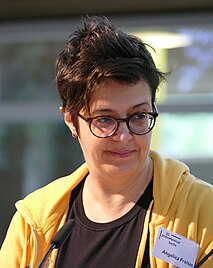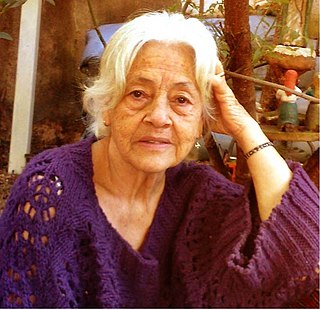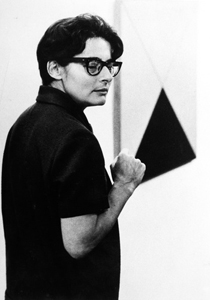 W
WBruna Beber Franco Alexandrino de Lima is a Brazilian poet and writer.
 W
WAdalcinda Magno Camarão Luxardo was a Brazilian writer, educator and composer.
 W
WKátya Pujals Chamma is a Brazilian songwriter, singer, poet, writer and cultural producer.
 W
WMariana Coelho was a Portuguese Brazilian educator, essayist and poet, and a feminist pioneer in Brazil.
 W
WCora Coralina is the pseudonym of the Brazilian writer and poet Anna Lins dos Guimarães Peixoto Bretas. She is considered one of the most important Brazilian writers. Her first book was published in June 1965.
 W
WAmália dos Passos Figueiroa was a Brazilian poet and journalist.
 W
WNísia Floresta Brasileira Augusta, pseudonym of Dionísia Gonçalves Pinto, was a Brazilian educator, translator, writer, poet and feminist.
 W
WAdélia Josefina de Castro Fonseca was a Brazilian poet. Her parents were Justiniano de Castro Rebello and Adriana de Castro Rebello. She married Inácio Joaquim da Fonseca. She published her poems in newspapers and books, and was a constant collaborator with the Almanaque de lembranças luso-brasileiro. Towards the end of her life, she entered the Convent of Santa Teresa, in Rio de Janeiro, adopting the name of Mother Maria José de Jesús.
 W
WAngélica Freitas is a Brazilian poet and translator.
 W
WRuth Guimarães Botelho was the first Afro-Brazilian author to gain a national audience and critical attention for her novels, short stories, and poetry. A classical scholar, she translated works from French, Italian and Spanish and studied Greek and Latin, though her works reflected fables, folklore, herbal medicines and legends of Afro-Brazil. She established several cultural preservation societies, served as head of the Ministry of Culture for Municipality of Cruzeiro, São Paulo, and was a member of the São Paulo Academy of Letters.
 W
WMaria Rita Kehl, ORB is a Brazilian psychoanalist, journalist, poet, essayist, cronista and literary critic. In 2010, she won the Jabuti Award in the category "Education, Psychology and Psychoanalysis" and the Human Rights Award from the Brazilian government "in the Media and Human Rights category".
 W
WAnilda Neves Leão (1923–2012) was a Brazilian poet, writer, feminist, actress and singer. She was a member of numerous feminist organizations in Alagoas and attended the 1963 World Congress on Women in Moscow. She published her first volume of poems in 1961 and her last volume in 2002. She performed in theater and the burgeoning film industry in Alagoas, writing scripts and acting in both short films and features.
 W
WAdriana Lisboa is a Brazilian writer. She is the author of six novels, and has also published poetry, short stories and books for children. Originally written in Portuguese, her books have been translated into more than a dozen languages. Crow Blue is Lisboa's most recent novel translated into English and was named a book of the year by The Independent (London). Her stories and poems have appeared in Granta, Modern Poetry in Translation, The Brooklyn Rail, Litro, The Missing Slate, Joyland, Sonofabook, Waxwing, and others.
 W
WHenriqueta Lisboa (1901–1985) was a Brazilian writer. She was awarded the Prêmio Machado de Assis for her lifetime achievement by the Brazilian Academy of Letters. She is famous for her well-chosen words to create powerful poems. Her early lyrics deal with traditional poetic themes, while her later poems like Echo, she mysteriously magnifies the effect of a single image.
 W
WBruna Patricia Maria Teresa Romilda Lombardi is a Brazilian poet, writer, model, and film and TV actress. She is daughter of Italian film producer Ugo Lombardi.
 W
WElisa Lucinda is a Brazilian actress, singer, poet, writer and journalist. Born in Cariacica, Espírito Santo, she studied poetry between the age of 11 and 17. Lucinda attended journalism school at Vitória, when she worked writing for newspapers and in a news program. Lucinda was 27 when she decided to move to Rio de Janeiro to become an actress; however, her poetry was more successful. After selling poems and hand-written books, she attracted attention from stage and television directors, debuting on Rede Manchete's telenovela Kananga do Japão in 1989.
 W
WCecília Benevides de Carvalho Meireles was a Brazilian writer and educator, known principally as a poet. She is a canonical name of Brazilian Modernism, one of the great female poets in the Portuguese language, and is widely considered the best female poet from Brazil, though she combatted the word poetess because of gender discrimination.
 W
WAna Montenegro (1915–2006) was a Brazilian author, journalist, activist, editor, and poet. She was a militant communist and lived in exile for more than 15 years after the 1964 coup. She was a lawyer who advised on human rights and women's rights issues and actively fought against racism. She wrote extensively on women's issues, from their health to their socio-economic rights; the legal-cultural struggle of blacks against racism; and the struggles of urban and rural workers to gain their rights under the Constitution. After returning from exile, she was honored by her local bar association, her state, and the nation of Brazil for her human rights work. In 2005, she was one of the 1000 women nominated for the Nobel Peace Prize.
 W
WViviane Mosé is a Brazilian poet, philosopher, psychologist, psychoanalyst and public policy consultant. She received a Ph.D from the Federal University of Rio de Janeiro's Institute of Philosophy and Social Sciences. She published her doctoral thesis, Nietzsche e a grande política da linguagem in 2005, through the Civilização Brasileira publishing house.
 W
WPatrícia Rehder Galvão, known by her pseudonym Pagu was a Brazilian writer, poet, playwright, journalist, and translator who had a large role in the Brazilian Modernist movement. Pagu was also politically active, being associated to the Brazilian Communist Party during the 1930 decade.
 W
WNatália Borges Polesso is a Brazilian writer. She was born in Bento Goncalves in 1981. She obtained a PhD from the Pontifical Catholic University of Rio Grande do Sul. She has published three books to date. She also writes for the Caxias do Sul newspaper Pioneiro and pens the online comic strip A Escritora Incompreendida.
 W
WAdélia Luzia Prado Freitas is a Brazilian writer and poet.
 W
WMira Schendel was a Brazilian contemporary artist of the 20th century. She made numerous drawings on rice paper, but was also active as a painter, a poet, and a sculptor. Her work drew upon the art of language and poetry, and what appears to have driven her was the ability to reinvent it.
 W
WAuta de Souza was a Brazilian poet. She wrote Romantic poems, with some Symbolistic influence.
 W
WJúlia Malvina Hailliot Tavares was one of the most active Brazilian militant anarchists, as well as a poet and a pioneer of modern education in southern Brazil. She was responsible for the creation of a secular school, the "Modern School of Francisco Ferrer", in the municipality of São Gabriel do Lajeado, which educated generations of libertarians.
 W
WDora Alencar Vasconcellos (1910–1973) was a Brazilian poet and diplomat